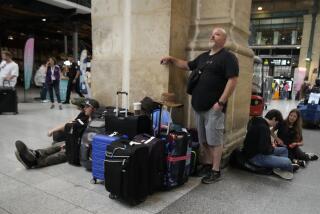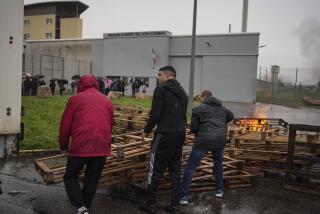France Arrests 13 in Morocco Suicide Attacks
- Share via
PARIS — In a broad European crackdown driven by recent bloodshed in Spain, police in France on Monday arrested 13 people accused of ties to the Moroccan Islamic Combatant Group, a network implicated in last month’s Madrid train bombings.
French authorities said the arrests in working-class suburbs resulted from an investigation of suicide bombing attacks last year in Casablanca, Morocco. European investigators say they have established numerous connections between that case and the March 11 bombings aboard Madrid commuter trains that killed 191 people.
After a confrontation this weekend in Madrid, in which five suspects in the train bombings blew themselves up as police closed in, investigators fear that terrorist groups in Europe are more dangerous than ever, and they are scrambling to try to prevent new attacks.
Recent raids in Spain, Belgium, Italy and now France have targeted Moroccans, whose role with Al Qaeda appears to have changed after years of mostly handling logistics and furnishing fraudulent documents.
In the past, suspected terrorist leaders and members of elite cells -- such as that of the Sept. 11 hijackers -- were more likely to be Persian Gulf Arabs, Egyptians and Pakistanis. Those on the front lines of attack plots in Europe were more likely to be Algerians and Tunisians.
Many of the suspects in the Madrid bombings exemplify a new reality, police say: Westernized, well-educated and well-established immigrants, most of them Moroccans, who committed Europe’s worst terrorist attack in years and ended up immolating themselves along with a Spanish SWAT team officer.
“There’s a lot of confusion right now,” said an investigator in Italy, where police detained more than 150 suspected extremists last week. “The networks are changing fast, and it’s hard to understand anything anymore. The groups are mixing together and it’s hard to stay on top of them. There was this idea that Moroccans wouldn’t be kamikazes -- well, you saw what they did Saturday night.”
The rise of Moroccan extremists poses particular challenges because of the size of the Moroccan immigrant communities in Spain, France, Italy, Belgium and the Netherlands, experts say.
The Casablanca and Madrid cases also exposed a convergence of extremism and gangsterism in Tangier, a gritty Moroccan port city that experts say serves as a hub for the northbound international flow of drugs and immigrants, comparable to Tijuana at the California border. It is also seen as a base for extremists entering or fleeing Europe.
Tangier “has been very neglected by the Moroccan government,” said Olivier Roy, a scholar on Islam at the National Center for Scientific Research here. “It’s a center of drugs and smuggling as well as extremism.”
Suspects in the Casablanca and Madrid cases were born in or spent considerable time in Tangier and followed a radical imam there who once preached at a mosque in Hamburg, Germany, that was frequented by the Sept. 11 plotters. Another Tangier imam arrested in the Casablanca case is reportedly the brother of a Moroccan drug lord.
“Morocco is in the process of becoming a land of jihad,” said Claude Moniquet, director of the European Strategic Intelligence and Security Center, a Brussels think tank. “The reality is that there is a profound, well-structured Islamic movement that is gaining ground there....The Moroccan security services are struggling with this.”
Three suspects among the nine men and six women initially held by French police Monday were wanted by Morocco in connection with the Casablanca bombings in May, which killed 45 people at five locations, including a Spanish restaurant and cultural center. The suspects include a man named Mustapha Baouchi, who allegedly underwent training at an Afghan terrorist camp, authorities said.
Two people were released Monday, leaving 13 to undergo questioning by French police. Most of the suspects are French citizens, but they traveled extensively and may have played significant roles in the network that carried out the Casablanca attacks, a senior investigator said.
“They could be important people,” the investigator said. “They moved around a lot.”
The operation was coordinated with Moroccan and Spanish police, Yves Bot, the chief prosecutor in Paris, said in a statement. Both France and Spain are investigating the Casablanca bombings because their citizens were among the victims.
The Moroccan case has taken on urgency as Spanish police scour the Islamic networks for people connected to the Madrid bombings and try to head off follow-up attacks, such as a foiled attempt Friday to bomb a high-speed Madrid-Seville train.
In Madrid on Monday, police identified another of the bodies of the five suspects who died in the suicide explosion as Jamal Ahmidan, a Moroccan for whom an arrest warrant was issued last week. Police consider him one of three lead plotters of a cell comprising mostly entrepreneurs, students and manual laborers. The other two are Sarhane Abdelmajid Fakhet, a Tunisian who died in Saturday’s explosion, and Moroccan Jamal Zougam, a Madrid shopkeeper who is behind bars.
Like Zougam, Abdelmajid surfaced during an investigation several years ago as an associate of an Al Qaeda cell in Madrid that was dismantled in 2001, a Spanish law enforcement official said.
Also Monday, the exhaustive search at the shattered apartment building where the suspects blew themselves up raised the prospect that a sixth suspect might have died. Authorities said they were examining body parts that did not correspond to the five known suspects, and would conduct forensic tests to determine whether there was an additional casualty.
*
Special correspondent Cristina Mateo-Yanguas in Madrid contributed to this report.
More to Read
Sign up for Essential California
The most important California stories and recommendations in your inbox every morning.
You may occasionally receive promotional content from the Los Angeles Times.













